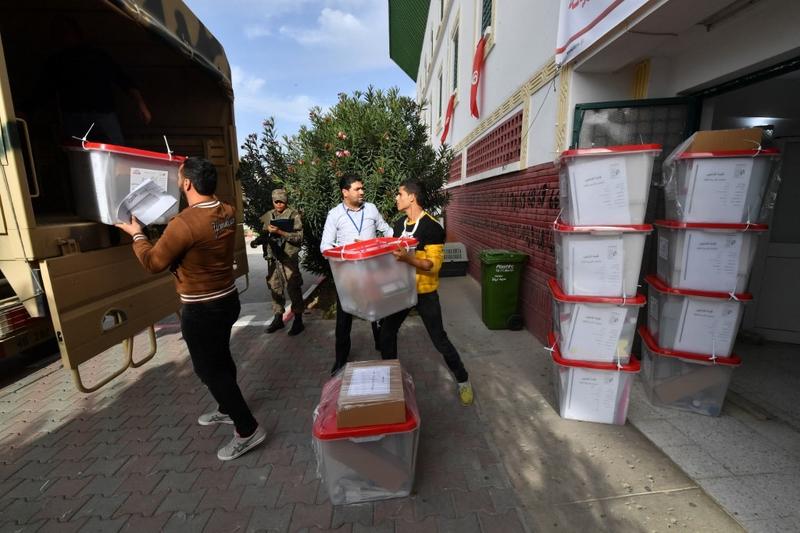 Employees load ballot boxes into a supervised military truck that will transport them to a polling station in the district of Ariana near Tunis on Dec 16, 2022, ahead of tomorrow's legislatives elections. (FETHI BELAID / AFP)
Employees load ballot boxes into a supervised military truck that will transport them to a polling station in the district of Ariana near Tunis on Dec 16, 2022, ahead of tomorrow's legislatives elections. (FETHI BELAID / AFP)
TUNIS - Tunisia holds a parliamentary election on Saturday that will tighten President Kais Saied's grip on power, capping what his opponents denounce as a march to one-man rule over a country that shook off dictatorship in 2011.
Taking place 12 years to the day after Tunisian vegetable seller Mohamed Bouazizi set himself on fire in an act of protest that sparked the Arab Spring, the ballot bolsters a new political order following Saied's dissolution last year of the previous legislature.
Kais Saied, a former law lecturer who was a political independent when elected president in 2019, has described the election as part of a roadmap for ending the chaos and corruption he says afflicted Tunisia under the previous system
Saied, a former law lecturer who was a political independent when elected president in 2019, has described the election as part of a roadmap for ending the chaos and corruption he says afflicted Tunisia under the previous system.
Islamist Ennahda and other parties in the post-revolution period meanwhile accuse him of a coup, and have rejected the ballot along with all the president's other moves since last summer, when he dissolved parliament and began ruling by decree.
Voters will be choosing a parliament largely defanged by a new constitution, approved with a low turnout in a July referendum that was engineered by Saied to shift Tunisia back towards a presidential system.
ALSO READ: New Tunisia constitution passed in vote with low turnout
He appoints the prime minister under the new constitution - a departure from the previous system which gave parliament a central role in picking the cabinet.
Nejib Chebbi, head of an anti-Saied coalition including Ennahda, said the election amounted to a "a still-born farce", and the result seems unlikely to have any impact on government policy.
It is also taking place amid an economic crisis that is fuelling poverty, leading many to attempt the perilous journey to Europe aboard smugglers' boats.
The government hopes to secure a $1.9 billion International Monetary Fund (IMF) rescue, but that is dependent on unpopular reforms.
Saied's rule has drawn opposition from a growing range of groups. The powerful UGTT labour union, which has supported some of his actions but which he has this year cut out of economic policymaking, has come out strongly against him and the election in the run-up to the vote.
READ MORE: Tunisian constitution panel head blasts president's draft
Al Bawsala, a non-governmental organization that has monitored the work of parliament, has said it will boycott the new legislature which it believes will be an instrument for the president.
With the main parties absent, a total of 1,058 candidates - 120 of them women - are running for 161 seats.
For 10 of those - seven in Tunisia and three decided by expatriate voters - there is just one candidate. A further seven of the seats decided by expatriate voters have no candidates running at all.


